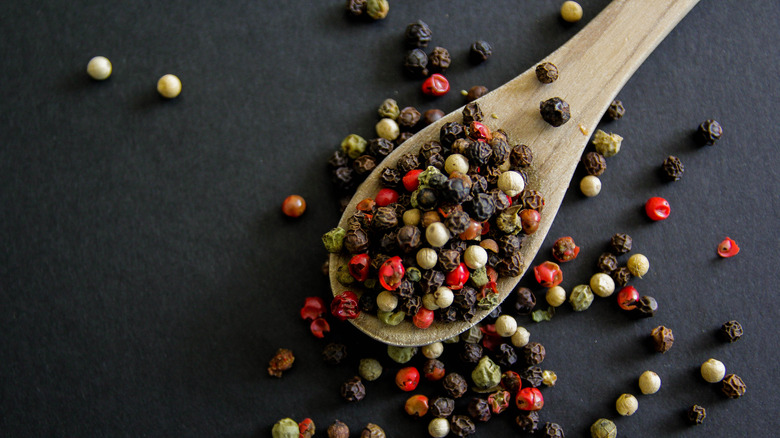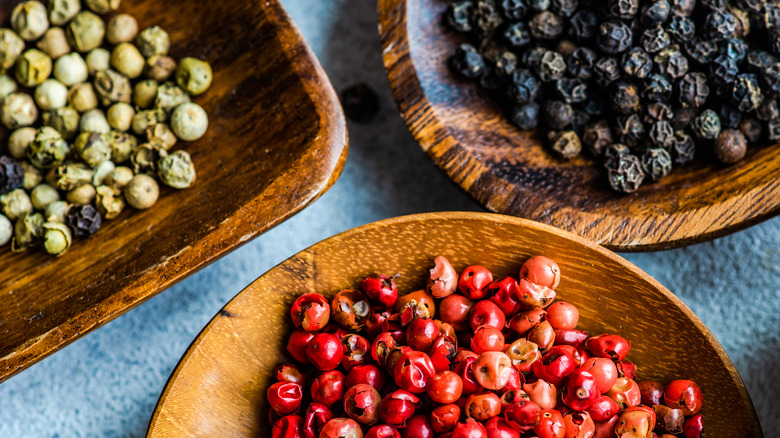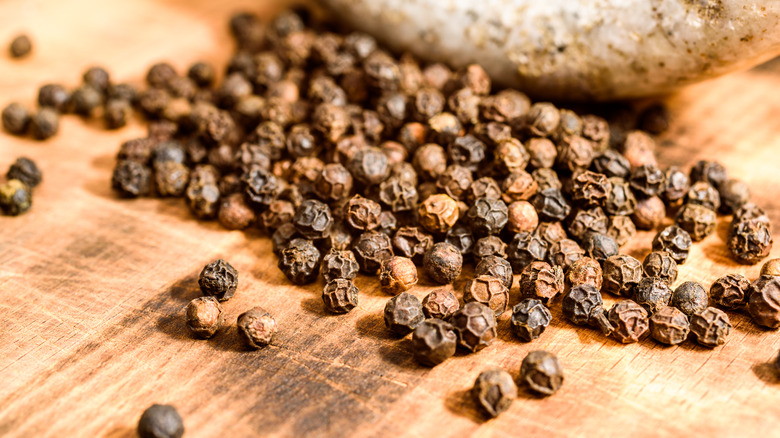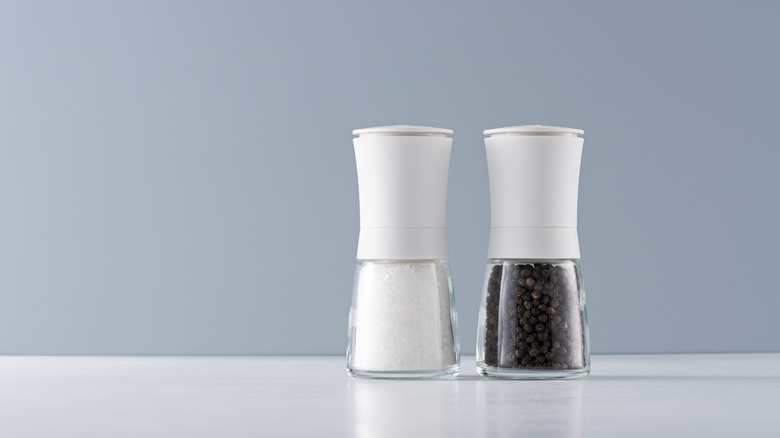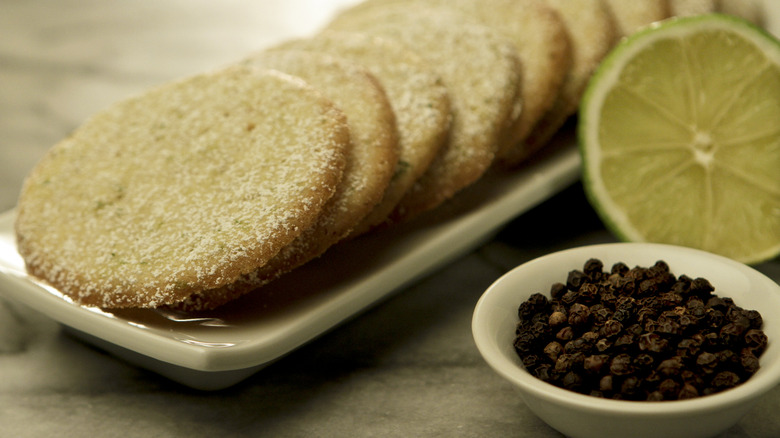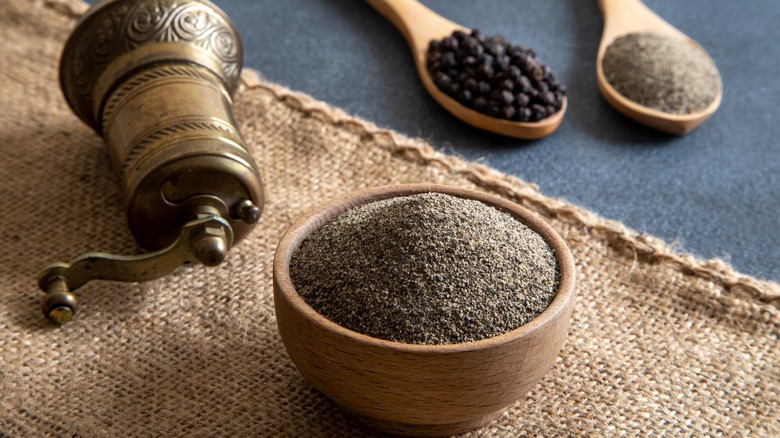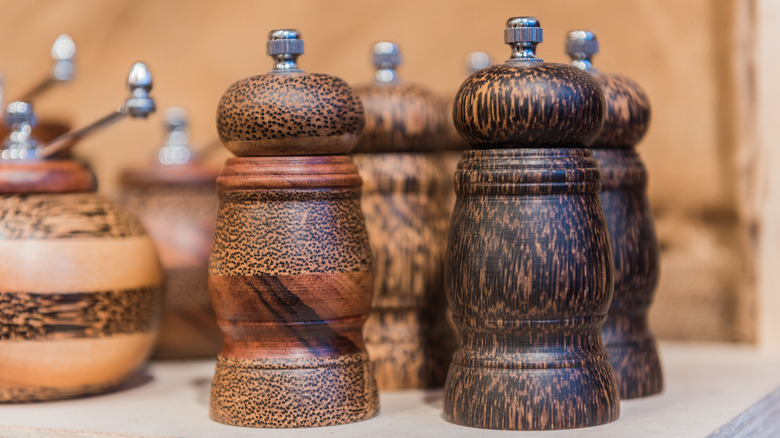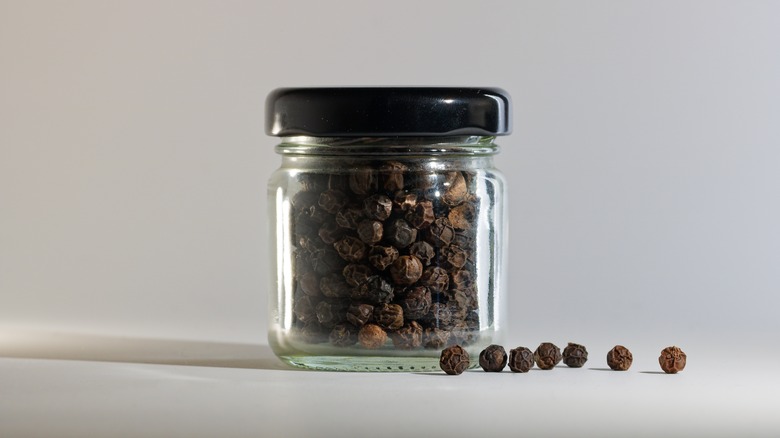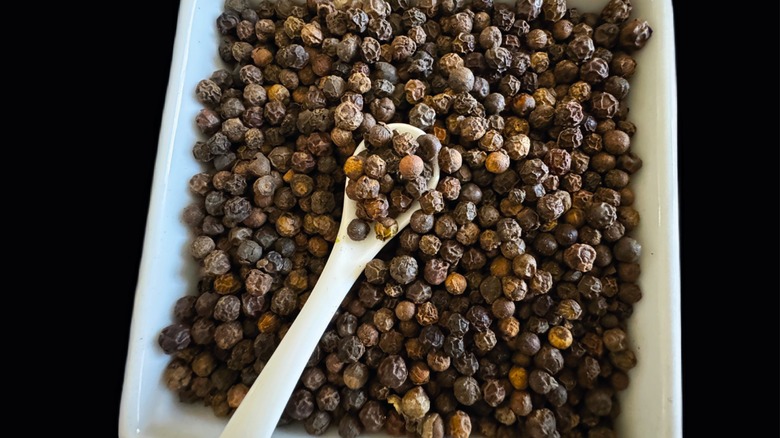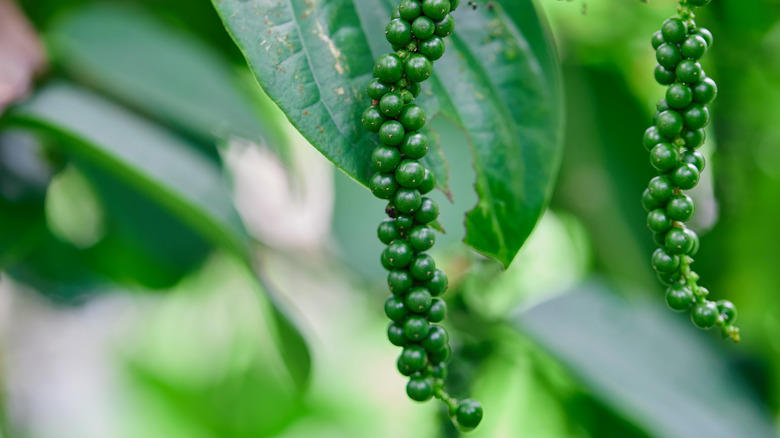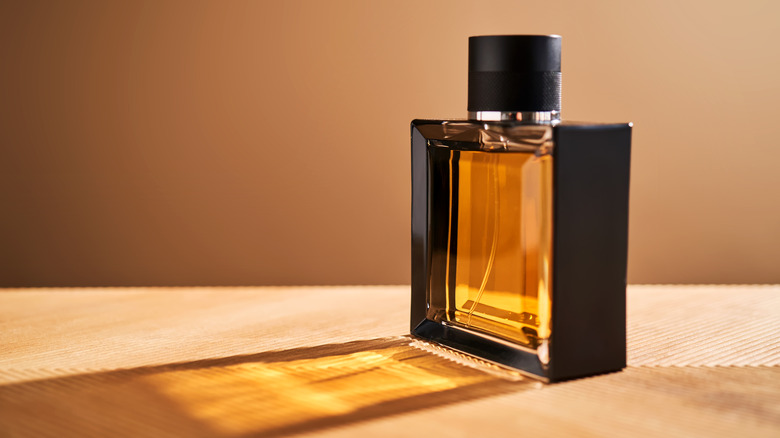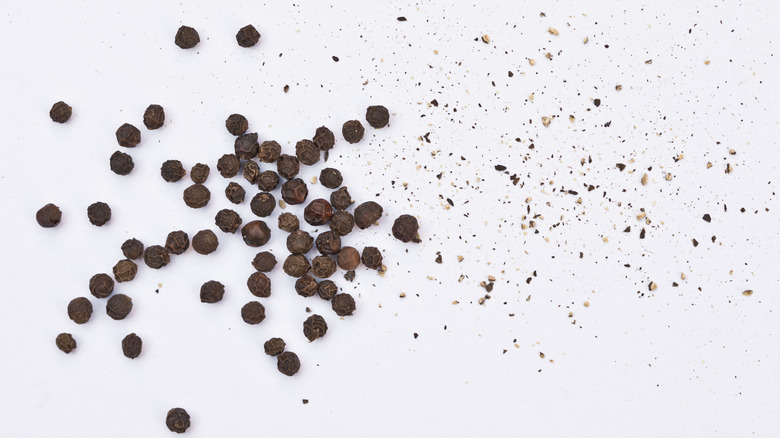12 False Facts About Peppercorns You Thought Were True
Peppercorns are something most keen cooks use multiple times a week. Salt and pepper are seen as the two essential seasonings and your pepper mill likely gets a regular workout. But, you may be surprised to learn that some of what you thought you knew about pepper is incorrect. There's a lot of misinformation about peppercorns flying around and this can ultimately end up making your cooking worse.
Many people, for example, think peppercorns begin and end with black pepper, meaning they're missing out on other options. Or, some people believe that every savory dish needs pepper and end up adding it to recipes that would be better without it.
It's nothing to be embarrassed about, we all get things wrong sometimes. But, uncovering the false facts about peppercorns you've spent years believing will help you get to the truth. Once you know more about this incredible spice, you'll soon be using it to its best advantage. You'll get more out of your peppercorns and end up making even more delicious food.
1. False: There's only one type of peppercorn
If you've spent your life thinking that black peppercorns are the only type available, you're not alone. It's a common misconception. In reality, there are several types of peppercorn, each with their own flavor profile and ideal uses.
Black peppercorns are the most common. Farmers pick these while they're still green and let them dry until they turn black. They have a strong, spicy flavor, giving dishes a mild kick. Then, there are white peppercorns. These start as black peppercorns, but workers remove their outer skin. Wondering what the difference between black and white peppercorns is? White ones have a milder, earthier taste. Chefs often use white pepper in light-colored foods so you don't see dark specks.
Green and red peppercorns are less common varieties. Green peppercorns are young and unripe. They have a fresher, fruitier taste than black pepper. You'll often find them packed in brine or dried. Red peppercorns are fully ripe berries. They're less common and have a sweeter, fruitier flavor than the other types.
You can also buy pink peppercorns, but they're not really pepper. They come from a different plant from true peppercorns. They have a mild, sweet taste. So mild, in fact, that you can put them whole on top of dishes.
2. False: All black peppercorns are equally good
Most folks think that black pepper is black pepper. It's all basically the same. So, if you buy the cheapest peppercorns from the grocery store, there's really no difference between them and pricier varieties. Sorry to break it to you, but that's a false fact. Actually, there are two main types of black peppercorns and there is a difference between them.
Malabar peppercorns are the regular black peppercorns that most of us are familiar with. If you buy something labeled "black peppercorns" this is what you're getting. There are also Tellicherry peppercorns, which are larger and generally considered the superior option. It's a common misconception that Malabar and Tellicherry varieties come from a different plant, but they're really the same thing in different sizes.
When peppercorns are harvested and dried, any that are larger than a certain size — usually 4.25 millimeters — are classed as Tellicherry peppercorns. They don't just come from the same type of plant but literally the same vine. This might make it seem like the whole Tellicherry thing is a swindle, but size does matter when it comes to peppercorns. When they grow past a certain size, they lose some of their heat but gain certain aromatic compounds. So, Tellicherry peppercorns are less punchy but more flavorful with complex citrus notes.
3. False: Black pepper is indigestible
You might have heard that your digestive system can't process black pepper but this isn't true. It's not only entirely digestible, it's actually beneficial to digestive health. So, yes, you will digest black pepper — it's not just going to pass straight through you. But, you might be doing your gut health some good by eating it regularly.
Several studies suggest that black pepper can boost digestion. The exact reason for this is still being studied and debated, but some experts say it's due to pepper encouraging the secretion of digestive enzymes, therefore making food pass through the gastrointestinal system more easily.
Another potential digestive benefit is that black pepper might increase the absorption of other nutrients. It's thought that piperine, the compound in peppercorns that makes them spicy, plays a role in allowing your digestive system to better absorb curcumin and resveratrol. Curcumin is found in turmeric and has wide-ranging anti-inflammatory properties. Resveratrol is a compound in red wine that's thought to lower the chance of heart disease, type 2 diabetes, and certain brain disorders.
So, if you're concerned that black pepper is going to go straight through your system, don't worry. It's a misconception that we've heard repeated, but not one that bears any weight. Rather, black pepper has a positive impact on the digestive system and the way it absorbs nutrients from food.
4. False: Pepper, along with salt, is a basic seasoning that all recipes need
Seasoning food with salt and pepper is often seen as a given. It's a common belief that all dishes need some pepper, just like they need some salt. Then, any other necessary herbs and spices are in addition to these basic seasonings. However, we're about to hit you with the truth — you don't need black pepper in every dish. In fact, it doesn't make sense to use it for everything.
Salt is essential in every dish. It not only adds saltiness, of course, but it also brings out the inherent flavors in other ingredients. Pepper, on the other hand, is a spice. Saying that you need to season everything with peppercorns is like saying every dish needs cumin or smoked paprika. Sometimes, it's just not called for.
Adding pepper to your dish is always going to give it peppery notes. Sometimes that's what you want, but other times it isn't. A delicate asparagus soup, for instance, might be overwhelmed by a generous helping of black pepper. Plus, you might just want variety in your cooking. You have many options besides pepper. Try using different herbs, spices, or a squeeze of lemon juice to bring more flavor.
Of course, you can season with pepper whenever you want, but don't think that you always have to. Some dishes and cuisines don't use black pepper often, so if you're following a recipe and pepper isn't an ingredient, that's probably the case for a reason.
5. False: Peppercorns are only for savory recipes
Most people think of pepper as something you sprinkle on savory foods, but did you know you can use pepper in sweet treats, too? It might sound strange, but it works. If you're bored of one-note desserts and bakes, a little help from peppercorns might be what you need.
When you add a small amount of pepper to sweet foods, it doesn't make them spicy. Instead, it gives them a subtle warmth and depth of flavor. For instance, you could try adding a pinch of black pepper to chocolate chip cookies. The pepper enhances the chocolate flavor and gives the cookies a slight kick. You can also sprinkle some pepper into brownie batter for a richer taste. Pepper is even traditional in some sweet bakes, such as Icelandic cookies known as piparkokur or a Finnish gingerbread called piparkakut.
Pepper works well with fruits, as well. A little black pepper in a strawberry pie filling can make the fruit taste even more flavorful. Some bakers add white pepper to pear or apple desserts for an extra zing. Even simple desserts can benefit from pepper. Sprinkle some on vanilla ice cream or add it to whipped cream and see how you like it.
6. False: Ground pepper is just as good as whole peppercorns
A myth we've often heard is that ground pepper is just as good as whole peppercorns. That those little containers of pre-ground pepper taste just the same as the freshly cracked stuff. Yes, we know they're so much more convenient, but it's just not the same. In fact, it's a mistake to pick up pre-ground pepper.
When pepper is ground, it starts to lose its flavor quickly. The oils in the peppercorns that give pepper its taste and smell evaporate once they're exposed to air. Pre-ground pepper sitting on a shelf or in your cupboard has already lost much of its punch. Whole peppercorns, however, keep their flavor locked inside until you grind them. When you crack them open in a pepper mill, you're releasing those flavorful, aromatic oils just before using it. This gives you the freshest, most flavorful pepper possible.
Using a pepper mill also lets you control how coarse or fine you want your pepper. For some dishes, you might want larger pieces for a big crunch. For others, you might prefer a fine grind that blends in with the other ingredients. Whole peppercorns last longer than pre-ground pepper, too. So, if you don't get through it quickly, you're not going to end up wasting it. Grinding your own pepper might take a few extra seconds, but the boost in flavor is worth it.
7. False: All pepper mills are basically the same
If you've been made to believe that all pepper mills are basically the same, you've fallen for a common misconception. One that you spend $5 on at the supermarket isn't going to perform the same as a $100 model. Plus, there are a wide range of features that pepper mills can have, some of which might be better suited to your cooking style than others.
When you're looking for a pepper mill that works for you, start with the basics. How often do you use it and are you wanting to spend a decent amount of money on one that will last you decades? Do you need a pepper mill that offers 50 plus grind settings or can you make do with fine, medium, and coarse settings? Some models are more comfortable to hold and some grind pepper faster than others, which is great if you go through a lot of pepper. You can even find some electric models that take the work out of grinding.
So, no, not every pepper mill is created equal. However, that doesn't mean you have to spend a fortune on one. There are some perfectly good versions at reasonable prices. However, if you've got the budget and love having the best kitchen gadgets, you can certainly go all-out.
8. False: Black pepper never expires
Black peppercorns can stay fresh for a surprisingly long time if you store them properly. However, some people believe that they never expire, and this is untrue. So, how long do peppercorns last for and how should you be storing them?
When you keep whole peppercorns in an airtight container away from heat and light, they can last for as long as three years. However, if they're kept inside your pepper grinder or not stored in an airtight container, they're likely to be past their best after a year. That said, even after this time, peppercorns don't go bad in a way that makes them unsafe to eat. They just start to lose their flavor and strength. So, if you find an old jar of peppercorns in your pantry, they're probably still fine to use. They just might not taste as strong as fresh ones.
Ground pepper, on the other hand, doesn't keep its flavor nearly as long. Once pepper is ground, it starts losing its taste pretty quickly. Most experts say ground pepper is best used within three to four months for the best flavor. After that, it won't make you sick, but it won't add much taste to your food either.
9. False: There's no reason to toast black pepper
You probably think that peppercorns are sold at their most flavorful and are ready to grind. Of course, you can grind them straight out of the pack, but there's a simple trick to getting the most out of your black pepper: toasting it. And, the same goes for other types of peppercorns, too.
Toasting peppercorns is a simple way to boost their flavor. This easy trick can make your pepper taste even better in your dishes. If you've ever toasted whole spices to use in recipes like curries, this follows the same principle. When you toast peppercorns, it helps to release their natural oils. This makes them more flavorful and aromatic than they are when they're raw.
If you want to toast your peppercorns, it's quite simple. You take whole peppercorns and put them in a dry skillet over a medium heat. As the pan heats up, the peppercorns will start to warm and become fragrant. Keep toasting for about two to three minutes, occasionally tossing or stirring them. Watch them closely so they don't burn, as this will turn them bitter. When they're done, remove them from the pan and leave them to cool. You can then put them in a pepper mill and use them as normal.
10. False: Black peppercorns are seeds
One false fact that we hear all the time is that black peppercorns are seeds. However, this isn't true. A surprising fact about pepper is that black peppercorns are actually fruits. That's right, you're cracking dried fruit all over your food.
Peppercorns come from the Piper nigrum plant. And, black peppercorns are the fruit of that plant. The confusion comes from the fact that, like all fruits, peppercorns have seeds. In fact, black peppercorns consist of a thin layer of fruit with the seed still inside. The same goes for green peppercorns and red peppercorns.
White peppercorns, however, have the fruit stripped from the seed during processing. So, technically, white peppercorns are seeds, while other true peppercorns, including black ones, are fruits. Admittedly, there's more seed than fruit, but the fact remains. Black peppercorns are just a spicy, fragrant dried fruit.
11. False: Peppercorns are only used for cooking
It's a common belief that peppercorns are only used for cooking. In fact, black pepper isn't just for spicing up your food. It has a range of surprising uses outside the kitchen, too. So it's much more versatile than you might imagine.
In the perfume industry, black pepper adds spicy, warm notes to fragrances. Perfumers add it to all kinds of scents, since it's quite adaptable. It's woody but still fresh and blends well with a range of fruity and floral ingredients to make a complex fragrance.
You can use black pepper yourself to solve some common household problems. If you have ants in your house, you might be pleased to know that it works as a natural ant repellent. Gardeners use black pepper, as well. If aphids are bothering your plants, mix some ground pepper with water or oil and spray it on the leaves. It can help get rid of these bugs without using harsh chemicals.
Black pepper can also help your plants in another way. It can prevent fungi and mold from growing in soil, keeping your plants healthier. This has proven effective in studies, although it's not clear how well it translates when used as a home remedy.
12. False: There are no health benefits to black peppercorns
You might assume that black peppercorns don't add much nutrition to a meal and therefore don't do anything for your health. It's a natural assumption — after all, they're only small. But, the truth about black pepper is that it has a number of potential health benefits, according to Heathline.
Black pepper has antioxidants in it. These are substances that help protect your cells from damage. Consuming antioxidants may contribute to reduction in the risk of a range of diseases and ailments, including heart disease and certain cancers. Some researchers also think black pepper could help fight inflammation in your body. Inflammation is linked to many health problems, including arthritis and asthma, so reducing it could be good for you.
Other studies show a variety of potential health benefits, from reducing cholesterol to benefiting degenerative brain disease. However, there's still a lot more research that needs to be done to substantiate these claims and to see if any health benefits found in animal studies apply to humans, too. Even so, it can't hurt to add an extra grind of pepper to your meal.
